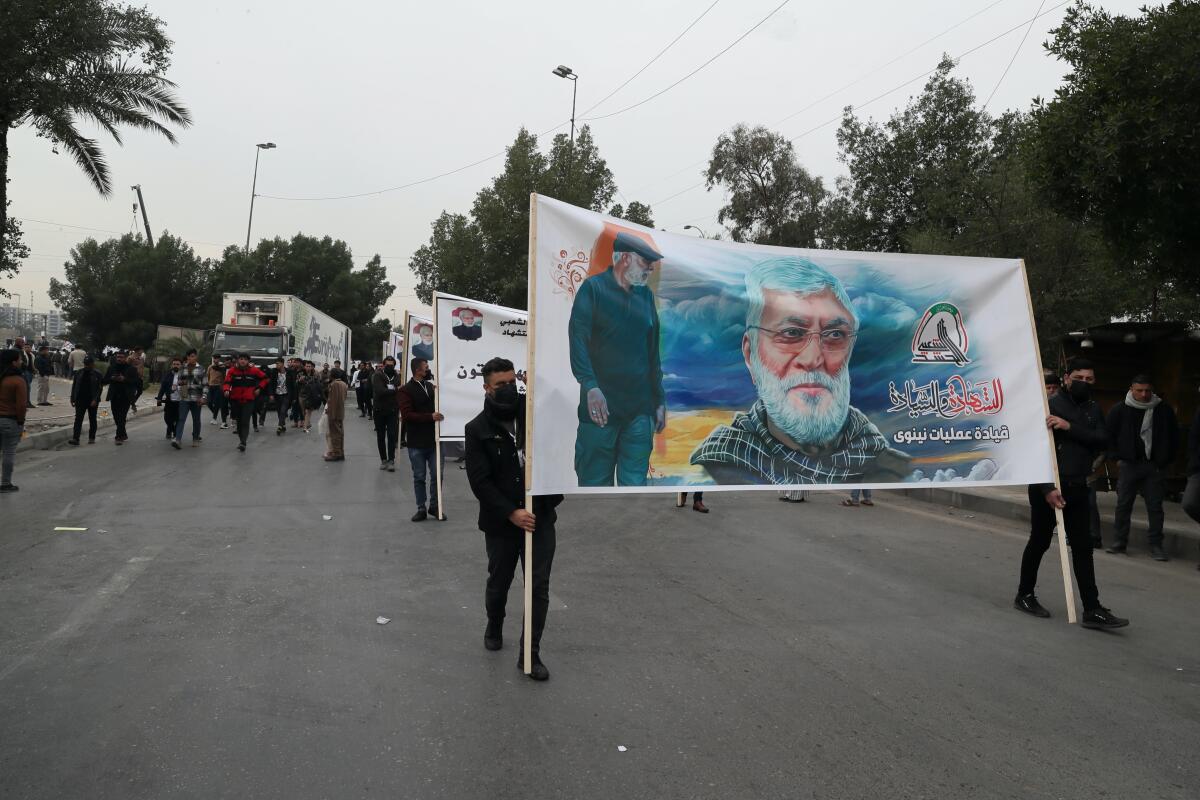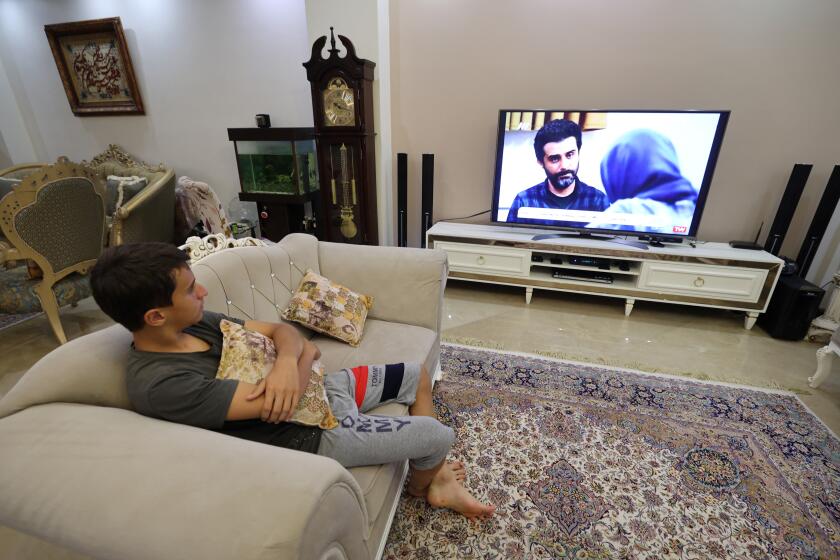Mideast tensions rise as Yemeni rebels seize UAE ship and hackers hit Israeli newspaper

- Share via
DUBAI, United Arab Emirates — Yemen’s Houthi rebels seized a ship in the Red Sea, armed drones targeted Baghdad’s international airport and hackers hit a major Israeli newspaper Monday — a string of assaults that showed the reach of Iran-allied militias on the second anniversary of the U.S. killing of a top Iranian general.
All three attacks coincided with a massive memorial in Tehran for Qassem Suleimani, the general killed by a U.S. drone strike in 2020 in Iraq. Iran’s hard-line President Ebrahim Raisi demanded that former President Trump “be prosecuted and killed.”
“If not, I’m telling all American leaders, don’t doubt that the hand of revenge will come out of ummah’s sleeve,” Raisi said, referring to the worldwide community of Muslims.
Monday’s events highlight tensions in the Middle East, a region roiled by Trump’s 2018 decision to unilaterally withdraw Washington from a deal aimed at limiting Tehran’s nuclear program. As talks continue in Vienna to try to resuscitate the accord, Iran remains able to apply pressure from outside the negotiations even as it is squeezed by U.S.-led sanctions and a shadow war with Israel.
The taking of the Emirati ship Rwabee marks the latest assault in the Red Sea, a crucial route for international trade and energy shipments. The Iranian-backed Houthis acknowledged the seizure off the coast of Hodeida, a long-contested prize of the grinding war in Yemen between the rebels and a Saudi-led coalition that includes the United Arab Emirates.
First word of the Rwabee’s seizure came from the British military’s United Kingdom Maritime Trade Operations, which said only that an attack had targeted an unnamed vessel around midnight. The coordinates it offered corresponded to the Rwabee, which has rarely given its location via tracking data in recent months, unlike most commercial traffic in the region, according to the website MarineTraffic.com.
A longtime campaign of military cyberattacks between Iran and its adversaries, including the U.S. and Israel, is shifting to include civilian targets.
A statement from the Saudi-led coalition, carried by state media in the oil-rich kingdom, acknowledged the attack on the Rwabee hours later, saying the rebels had committed an act of “armed piracy” involving the vessel. The coalition asserted that the ship carried medical equipment from a dismantled Saudi field hospital on the distant island of Socotra, without offering evidence.
“The Houthi militia must immediately release the ship. Otherwise, the coalition forces shall take all necessary measures and procedures to deal with this violation, including the use of force,” Brig. Gen. Turki Malki said in a statement.
The Houthis later aired footage from the Rwabee on their Al-Masirah satellite news channel. It showed military-style inflatable rafts, trucks and other vehicles on the vessel, a landing craft that lowers a ramp to allow equipment to roll on and off. One brief clip showed what appeared to be a collection of rifles inside a container.
“It is completely obvious today that the information that this ship was carrying a civilian field hospital is not correct,” said Yahia Sarei, a Houthi militia spokesman. “This is clearly military equipment.”
Israel’s prime minister has urged world powers to take a hard line against Iran in negotiations to curb the country’s nuclear program.
Saudi state television later alleged that the Houthis wanted to transfer weapons onto the ship.
An employee at the vessel’s owner, Abu Dhabi-based Liwa Marine Services, told the Associated Press that the Rwabee appeared to have been the target but said the company had no other information.
A similar assault happened in 2016 involving the Emirati vessel SWIFT-1, which had been sailing back and forth in the Red Sea between Yemen and an Emirati troop base in Eritrea. That vessel came under attack by Houthi forces. The Emirati government said the SWIFT-1 carried humanitarian aid; United Nations experts later said they were “unconvinced of [the claim’s] veracity.”
No group immediately claimed responsibility for the hacking of the Jerusalem Post’s website. The hackers replaced the English-language newspaper’s homepage with an image depicting a missile coming from a fist bearing a ring long associated with Suleimani.
Breaking News
Get breaking news, investigations, analysis and more signature journalism from the Los Angeles Times in your inbox.
You may occasionally receive promotional content from the Los Angeles Times.
The image also depicted an exploding target used during a recent Iranian military drill that was designed to look like the Shimon Peres Negev Nuclear Research Center, near the city of Dimona. The facility is home to decades-old underground laboratories that re-process the reactor’s spent rods to obtain weapons-grade plutonium for Israel’s nuclear bomb program.
Under its policy of nuclear ambiguity, Israel neither confirms nor denies having atomic weapons.
In a tweet, the Post acknowledged being the target of hackers.
“We are aware of the apparent hacking of our website, alongside a direct threat to Israel,” the newspaper wrote. “We are working to resolve the issue & thank readers for your patience and understanding.”
‘Gando,’ a ‘Homeland’-like hit TV series in Iran, is a sophisticated ploy by ultra-conservatives to torpedo delicate nuclear talks with the West.
The newspaper later restored its website. It noted that Iran-supporting hackers previously targeted its homepage in 2020.
The hack came after Israel’s former military intelligence chief in late December publicly acknowledged that his country was involved in Suleimani’s killing. The U.S. drone killed Suleimani as he was leaving Baghdad’s international airport.
In Iraq on Monday, troops shot down two so-called suicide drones at the Baghdad airport, U.S. and Iraqi officials said. No group immediately claimed the attack, though one of the drones’ wings had the words “Suleimani’s revenge” painted on it in Arabic. Militias backed by Iran have been suspected in similar assaults. No injuries or damage were reported.
As the head of the Quds, or Jerusalem, Force of the Revolutionary Guard, Suleimani led all of its expeditionary forces and frequently shuttled between Iraq, Lebanon and Syria. Quds Force members have been deployed to Syria to support President Bashar Assad in the long civil war there, and also to Iraq in the wake of the 2003 U.S.-led invasion that toppled Saddam Hussein, a longtime foe of Tehran.
Suleimani rose to prominence by advising forces fighting Islamic State in Iraq and in Syria, on behalf of Assad.
U.S. officials say that, under Suleimani, the Revolutionary Guard taught Iraqi militants how to manufacture and use especially deadly roadside bombs against U.S. troops. Iran has denied that.
More to Read
Sign up for Essential California
The most important California stories and recommendations in your inbox every morning.
You may occasionally receive promotional content from the Los Angeles Times.












